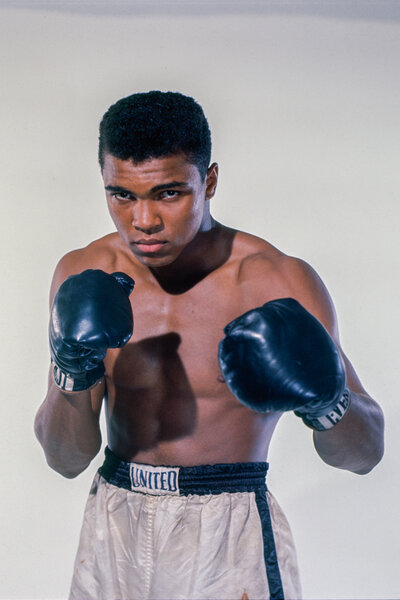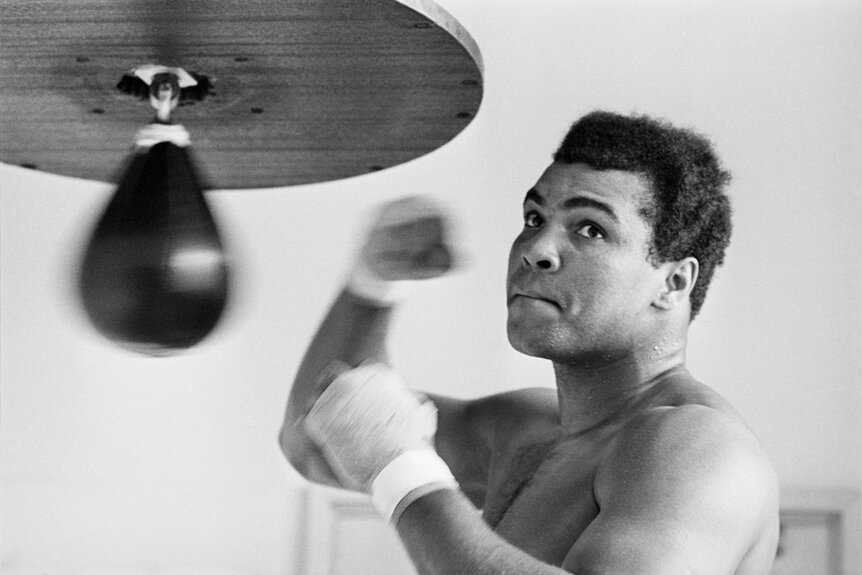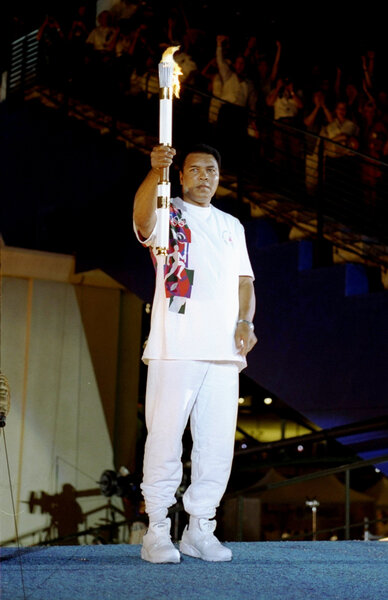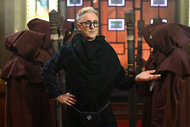Create a free profile to get unlimited access to exclusive show news, updates, and more!
All About Legendary Boxer Muhammad Ali and His Comeback Fight
Boxing great Muhammad Ali's 1970 comeback match figures into a high-stakes robbery dramatized in Peacock's Fight Night.
Heavyweight boxing champion Muhammad Ali was a legend in the ring. It’s where he’d famously “float like a butterfly, sting like a bee.”
In the fall of 1970, after a three-year suspension, he staged his historic comeback in Atlanta. The match against Jerry Quarry happened to coincide with one of the largest armed robberies in the U.S. ever.
Chalk it up to brazen thieves who seized a moment — and tons of cash. Peacock’s limited series, Fight Night: The Million Dollar Heist, premiering Thursday, September 5 and starring Kevin Hart, Samuel L. Jackson and Taraji P. Henson, is inspired by infamous events that went down after Ali put up his dukes.
Before the punchy new Peacock series comes out fighting, get up to speed on Muhammad Ali and his quest regain glory over a half a century ago in the Big Peach. And yes, Ali won — by a technical knockout.
RELATED: Inside Kevin Hart's Family Life: How Wife Eniko and His 4 Kids Shape His World
Ali’s Comeback Fight in Atlanta
By age 18, Cassius Clay — Ali’s given name at birth in Louisville, Ky. — had savored success. He’d won Golden Gloves titles and an Olympic gold medal in the light heavyweight division at the 1960 Rome Olympics. “The journey to becoming ‘The Greatest’ was well and truly underway,” reported olympics.com.
In 1964, four years into his professional career, he gained global fame by defeating Charles “Sonny” Liston for the title of heavyweight champion of the world.
But his career took a hit in 1967, when Ali refused to be drafted into the U.S. Army during the Vietnam War, citing religious and ethical reasons. As a consequence, he was stripped of his titles, fined, and banned from boxing for three years, per history.com. During this period, Ali became an advocate for civil rights and grew closer to Malcolm X.
The historic fight night on October 26, 1970 at the Municipal Auditorium in Atlanta, marked Ali’s hotly awaited return to the ring. The stakes couldn’t get any higher.
In the first two rounds of the match, Ali came out on top. But the deciding moment took place in the third round, when Ali struck Quarry above his left eye. The punch left Quarry with a bloody cut, at which point Quarry's trainer decided it was time to call the match, according to The Guardian.
RELATED: Kevin Hart Takes a Dramatic Turn in New Crime Series Fight Night: "Never Been More Excited"
What's Muhammad Ali's birth name?
After winning the heavyweight title in 1964, “Clay shouted ‘I shook up the world,’” reported NBC News. “Several days later he shocked it as well when he announced he was changing his name and joining the Nation of Islam.”
At the time he explained that he was shedding what the Nation of Islam viewed as his “slave name," and took on the title Muhammad Ali — a new identity for a new world champion. His self-reinvention was polarizing — threatening to the conservative establishment and nobly defiant by liberal opposition, according to The New York Times.
It was “the turning point for a great spiritual and political awakening,” according to msn.com.
But Ali’s victory over Quarry in October 1970 reignited his career. He continued boxing until his retirement in 1981.
Ali's Parkinson's Diagnosis
In September 1984, three years after retiring from boxing, Muhammad Ali shared that he was diagnosed with Parkinson's syndrome, a degenerative neurological condition that affected his speech and motor skills.
"I'm in no pain," he told The New York Times at the time, according to NBC News. "A slight slurring of my speech, a little tremor. Nothing critical. If I was in perfect health — if I had won my last two fights — if I had no problem, people would be afraid of me. Now they feel sorry for me. They thought I was Superman. Now they can go, 'He's human, like us. He has problems.' ''
Despite the challenges posed by the disease, Ali remained active in public life. He became an ambassador for peace and humanitarian causes, using his platform to raise awareness about Parkinson’s.
RELATED: How Taraji P. Henson Made It in Hollywood as a Single Mother
His Death in 2006
On June 2, 2016, Ali died at age 74 due to septic shock in Scottsdale, Arizona.
A larger-than-life figure, Ali “helped define his turbulent times as the most charismatic and controversial sports figure of the 20th century,” The New York Times noted in their obituary. Multiple notable figures spoke about his legacy in the wake of his death, including former presidents Barack Obama and Bill Clinton.
Notably, Will Smith and Mike Tyson were pallbearers at his funeral, with George Foreman and Larry Holmes being named honorary pallbearers, USA Today.
He was a man who transcended sports to become a global icon.
Fight Night: The Million Dollar Heist premieres Thursday, September 5 on Peacock. New episodes are released weekly.






















